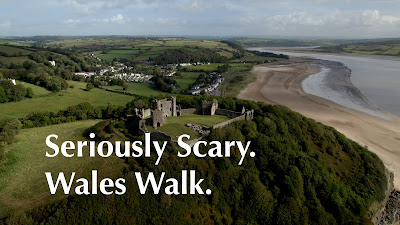Freezing spell brings coastal risks
The country is braced for a freezing, wintry spell of weather this week and HM Coastguard is reminding coastal visitors to pay attention to safety advice.
Scotland, North East and Central England and South Wales are going to face particularly cold conditions with a Met Office Yellow Weather warning for snow and ice, with temperatures across the UK falling.
It means that the cold turn will likely see more treacherous conditions at the coast, with more risks to visitors.
So far this year, we have seen a number of people cut off by the tide around the nation, with our Coastguard teams rushing to your aid.
Like the 25-year-old and his pug, who became trapped on a hard-to-access beach near Clovelly, as the tide closed in around him and cut him off from safety.
The incident sparked area commander Sam Wilson to issue a reminder to people of how quickly things can change at the coast.
Coastal Operations Area Commander Sam said: “He got caught out by some particularly big spring tides this month, it happens within minutes – one minute you are taking a nice walk along a beach and the next you realise the water has cut you off and you are in danger.
“It can happen to anyone, and it can happen at any time, so just make sure you are ready if the worst does happen.
“Always check tide times and, if possible, check where the water will reach at high tide. Some beaches disappear altogether. Always pay attention to local warning signs, as each area can have specific dangers.
“Take a fully charged mobile phone so you can call for help if you do end up in trouble.
“Call 999 and ask for the Coastguard.”
“It can happen to anyone, and it can happen at any time, so just make sure you are ready if the worst does happen.
“Always check tide times and, if possible, check where the water will reach at high tide. Some beaches disappear altogether. Always pay attention to local warning signs, as each area can have specific dangers.
“Take a fully charged mobile phone so you can call for help if you do end up in trouble.
“Call 999 and ask for the Coastguard.”
No sound
It is vital at this time of year to be prepared before you head to the coast.
- Consider if it is safe to go out at all.
- Make sure you check the weather and tides if you decide it is safe to head out, wear appropriate footwear and clothing for your activity, know the sea conditions and stick to coastal paths.
- Pay attention to local warning signs.
- Beware of mud on beaches – if you do get stuck, try to spread your weight as much as possible and avoid moving. Do not attempt to rescue someone else, call the Coastguard.
- If you take your dog out with you, keep it on a lead at the coast especially near cliff edges. If they get stuck on a ledge, in mud or swept out to sea, don’t go after them. Most dogs make it back safely, but you might not. People often put themselves in danger in a rescue attempt.
- Carry a mobile phone so that you have a way of making contact in an emergency and make sure you tell someone where you are going and when you will be back.
- Cliffs can be more unstable than they look, and cliff falls or landslides can happen without warning. Take note and adhere to local warning signs. The cliffs along the UK coastline are continuously eroding, stay away from the edge which could be crumbly or slippery and do not climb cliffs as a short cut to the top. Periods of intense rainfall will often make cliff edges more vulnerable.
- Don’t ever be tempted to stand near the edge to take a ‘selfie’ as it may be the last photo you ever take.
- If you find suspected ordnance, do not touch it. Call 999 and report it to the Coastguard.


